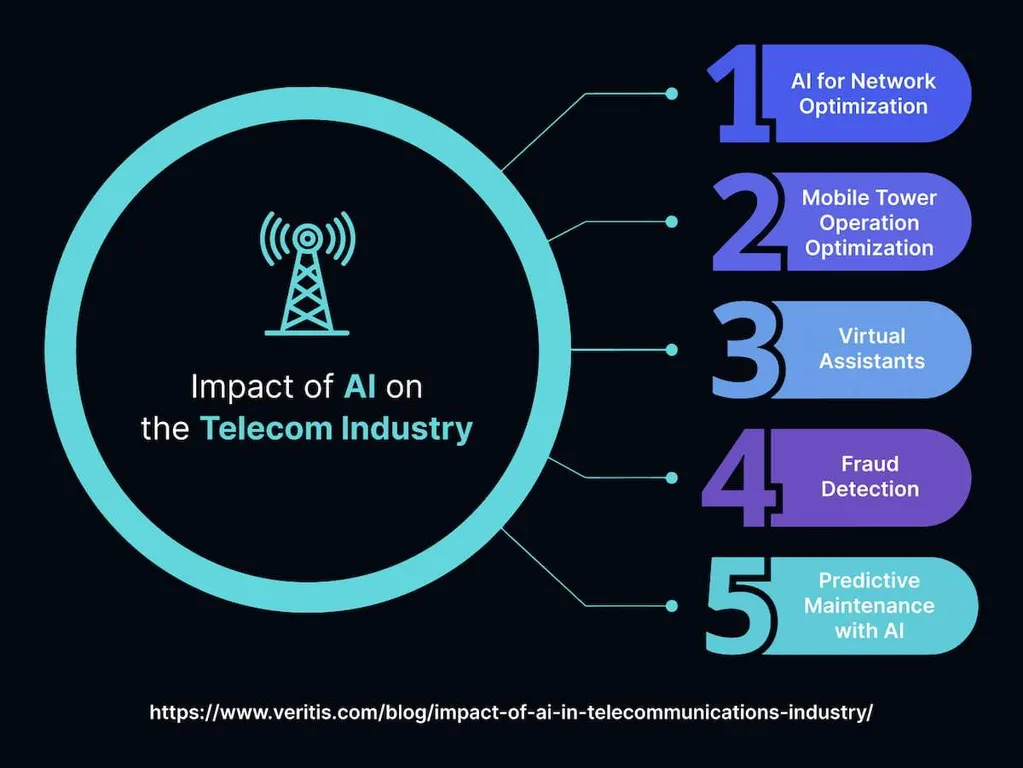The adoption of artificial intelligence technology led to the development of algorithm-based software. It enables companies to personalize customer experience (CX). Shaping the way support teams resolve client concerns, new digital products help businesses enhance connectivity. In this article, we will analyze the usage of AI in telecom services and consider how AI-powered tools help service providers stand out among the rest. Leveraging innovative solutions, AI-based systems facilitate the processing of large volumes of unstructured data.
Why Utilize AI in Telecom?
The telecom industry has been struggling due to skyrocketing expenses and decreasing ROI. Businesses spend up to 70% of their budgets on financing field and service operations. Implementing AI systems facilitates saving money and allocating valuable resources to development teams.
In the US, preserving human capital becomes arduous, as 40% of employees express dissatisfaction with their current positions and want to leave their jobs within 6 months. As hiring new staff members to handle the increased number of customer requests during peak times is unfeasible due to inconsistent workloads, businesses have started to use AI in telecommunications to remain competitive.
Deploying AI tools allows firms to reduce costs and improve client and employee retention rates. They facilitate creating schedules, making accurate predictions based on the analysis of gathered data, improving CX, and fostering efficiency. Let’s consider the main reasons for implementing AI in telecom services.
Enhanced CX
The telecom industry benefits from AI systems, enabling businesses to deploy smart forecasting tools, make their upselling efforts effective and increase customer engagement. Besides, companies use them to personalize ads and make targeted offerings using the data extracted with the help of analytics tools.
Another advantage of AI is that such systems assist customers at every step of their journey and provide timely recommendations impacting purchasing decisions. Companies no longer need to hire new staff as they optimize operations, avoid siloed data, and reduce overtime costs using AI.
Improved contact center processes
Telecom companies (telcos) utilize algorithm-based apps to shorten resolution times when communicating with customers and increase satisfaction. Quick replies to queries lead to better CX and fewer phone calls.
AI tools enable customer support (CS) agents to process information about a client’s previous requests, identify behavior patterns, recognize the signs of dissatisfaction, and take proactive steps to build brand loyalty. Employees can quickly analyze a customer’s billing history and solve issues.
Using automated solutions allows companies to optimize processes and focus on complex tasks. AI bots enable call centers to operate 24/7 and provide replies across multiple channels. Making them an integral part of legacy systems facilitates increasing the overall call center’s efficiency.
Optimized field force
Deploying AI systems, telecom organizations expedite the onboarding process and make educational programs effective. AI-generated content helps frontline workers to improve their performance by analyzing metrics. AI-powered coaching tools provide professional instructions and tailored recommendations. allowing staff members to reach their learning goals.
Another reason to use artificial intelligence in telecom firms is to provide personal coaching solutions to help employees on the way to personal growth. Such solutions facilitate accessing educational materials from smartphones.
Improving field force processes requires deploying smart scheduling tools, which allows technicians and other professionals to arrive on time and provide quick responses. In retail, AI facilitates the use of data to identify the reasons behind delays and foster workforce management.
How to Use AI in Telecom?

Providers should learn how to adopt and deploy AI systems effectively to improve the quality of their services, meet clients’ demands, reduce expenses, and achieve sustainable revenue growth. Let’s consider the main applications of AI in telecom businesses:
- In-depth analytics: AI models trained to process customer data allow employees to discover invaluable insights and predict future behaviors. Using the gathered data, providers tailor their offerings to make them appealing in the eyes of a target audience.
- Automated content generation: Telcos enhance the effectiveness of their marketing efforts by producing engaging content and grasping the attention of potential clientele. Task automation in telecom industry facilitates saving costs.
- Streamlined processes: By optimizing convoluted workflows, firms manage telecom networks with high effectiveness and minimize manual operations.
- Issue detection: Generative AI tools identify anomalies within datasets containing information about billing records and send notifications about discrepancies. By finding errors in financial reports automatically, enterprises spend less resources on threat mitigation.
- Trend forecasts: The analysis of billing data facilitates predicting future development, anticipating market fluctuations, and optimizing resource usage.
- Automated code generation: Using advanced co-pilot tools, developers achieve productivity goals faster. AI systems provide suggestions that speed up coding and minimize the occurrence of errors.
- Network optimization: Algorithm-based solutions handle huge volumes of data and prevent congestion issues. They enable firms to enhance the quality of provided services and achieve higher client satisfaction.
- Timely maintenance: AI solutions predict when equipment failure might occur, which enables employees to schedule maintenance sessions to reduce downtime.
Adopting efficient telecom customer experience practices, providers use virtual agents to facilitate troubleshooting, shorten the resolution times, and boost the satisfaction rate. Such bots also facilitate launching personalized marketing campaigns to increase conversions. AI systems streamline resource allocation and strengthen network security.
Leveraging the power of AI enables telcos to build resilient infrastructure. The ability of telecom networks to adapt to changing environments makes it easier to maintain them.
Challenges in Implementing Generative AI in Telecom
AI products increase network efficiency and enable firms to save valuable resources. However, despite the noticeable advantages of AI, companies that try to implement such solutions face such risks:
- Data quality: Training AI models requires using high-quality data sets without any errors and inaccuracies that may affect their performance. When launching marketing telecommunications campaigns, it’s pivotal to use fact-based data to make the right decisions.
- Integration with legacy systems: Outdated infrastructure may be incompatible with AI solutions. It requires telcos to make additional investments to ensure the seamless functioning of such products.
- A high level of technical expertise: Building sustainable AI solutions without a strong technical background is impossible. Finding a reliable service provider is the key to bolstering the quality of telecom services. MetaDialog has a team of experts who specialize in developing and deploying AI products that improve CS agents’ productivity by five times.
- Ensuring law adherence: As the telecom industry is heavily regulated, it is pivotal to meet privacy and security requirements when developing and expanding networks. Considering ethical issues and the inherent bias when using AI allows enterprises to follow professional standards and win stakeholders’ loyalty. Using reliable training data enables firms to avoid hallucinations when using AI and generate an accurate output.
- High initial investment cost: Implementing AI tools without third-party assistance is expensive. Entrusting a reliable provider with these tasks enables firms to increase ROI.
Avoiding costly mistakes without the help of a trusted service provider is impossible. Using advanced algorithms necessitates deploying extra computational resources. It requires using scalable AI solutions based in the cloud, as such tools are easier to monitor and maintain.
Tips and Reminders

As the share of AI in global telecom markets is expected to reach $14.99 billion by 2027, investing in such solutions early can bring tangible benefits for early adopters. The increased adoption of this technology will lead to the development of more powerful products, enhancing networks’ performance.
By embracing the best practices, telcos can become the industry’s frontrunners. Following these recommendations facilitates achieving sustainable success:
- Select the primary use cases of AI: Each team and department should adopt a unique approach to streamline operations. Identifying the main pain points is the first step toward developing a clear road map. Call centers and units that specialize in field operations have different needs, requiring a telecom firm to create suitable solutions to optimize processes.
- Use descriptive and predictive analytics tools: The adoption of an agile approach requires analyzing the available data to build solutions that can solve existing problems and eliminate bottlenecks.
- Focus on task automation: The implementation of automated solutions developed by MetaDialog enables firms to increase the efficiency of their CS teams and reduce the average response time to 20 seconds. The company can build a minimum viable product and customize it per clients’ requirements.
Creating teams comprising experts with strong technical skills, experienced managers, and other specialists facilitates AI implementation. Even though telcos face multiple challenges, the usage of AI creates new opportunities to achieve stable growth.
The Future of AI in Telecom
Telcos deploying AI chatbots report a 25% increase in customer satisfaction, which necessitates using such solutions to get an edge. As the industry is shaped by new technologies, embracing emerging trends is the only way to optimize networks, adopt the best CS practices, eliminate the possibility of fraud, and personalize marketing campaigns.
AI fosters the development of complex ecosystems capable of improving their performance over time. Telecom businesses use AI to make communications secure and cater to the needs of their target audiences.
In the coming years, AI products will be used to maintain compliance, achieve agility, and minimize operational expenses. As the technology continues to evolve, AI chatbots learn how to provide personalized services and solve more complex tasks without escalating issues to human agents.
Recognizing the importance of AI in telecom solutions based on large language models capable of processing data, MetaDialog creates tailored offerings to help its clients elevate their telecommunication services. Our seasoned professionals develop powerful algorithm-based systems fostering customer engagement and network growth. Get in touch with our team now and explore the possibilities opened by AI in the telecom industry.
